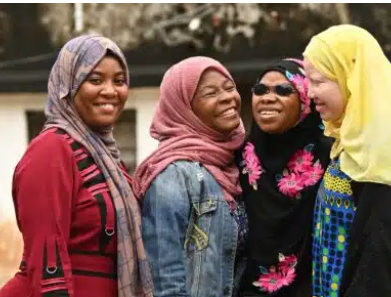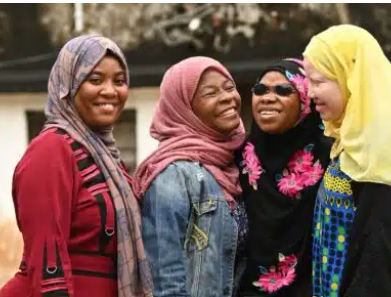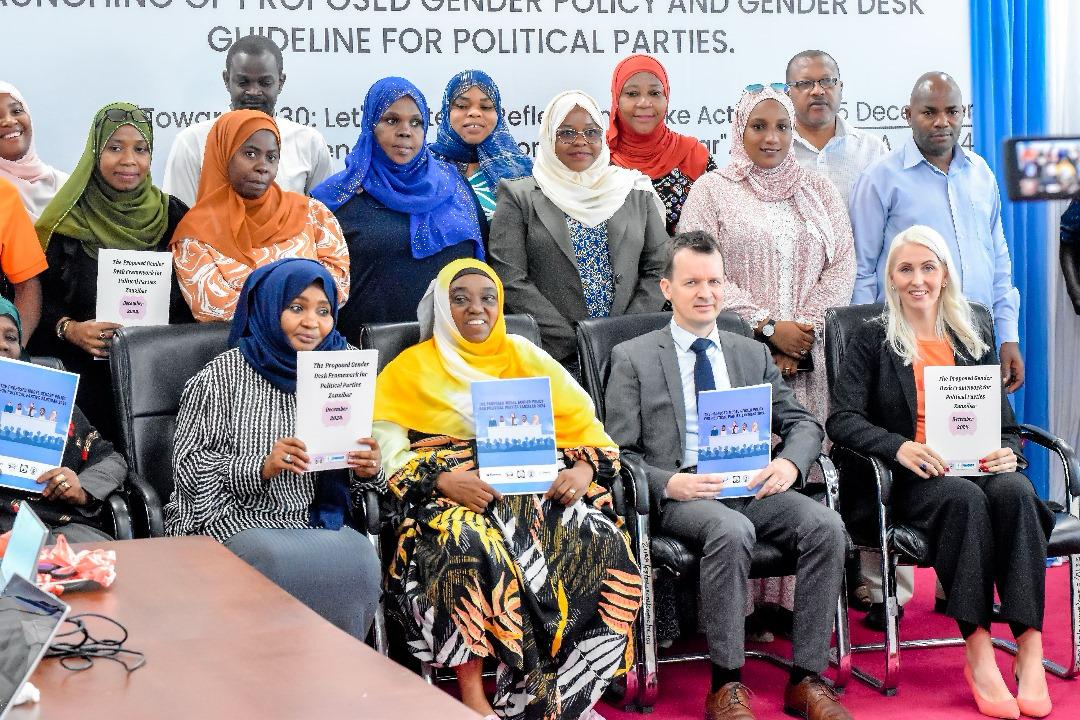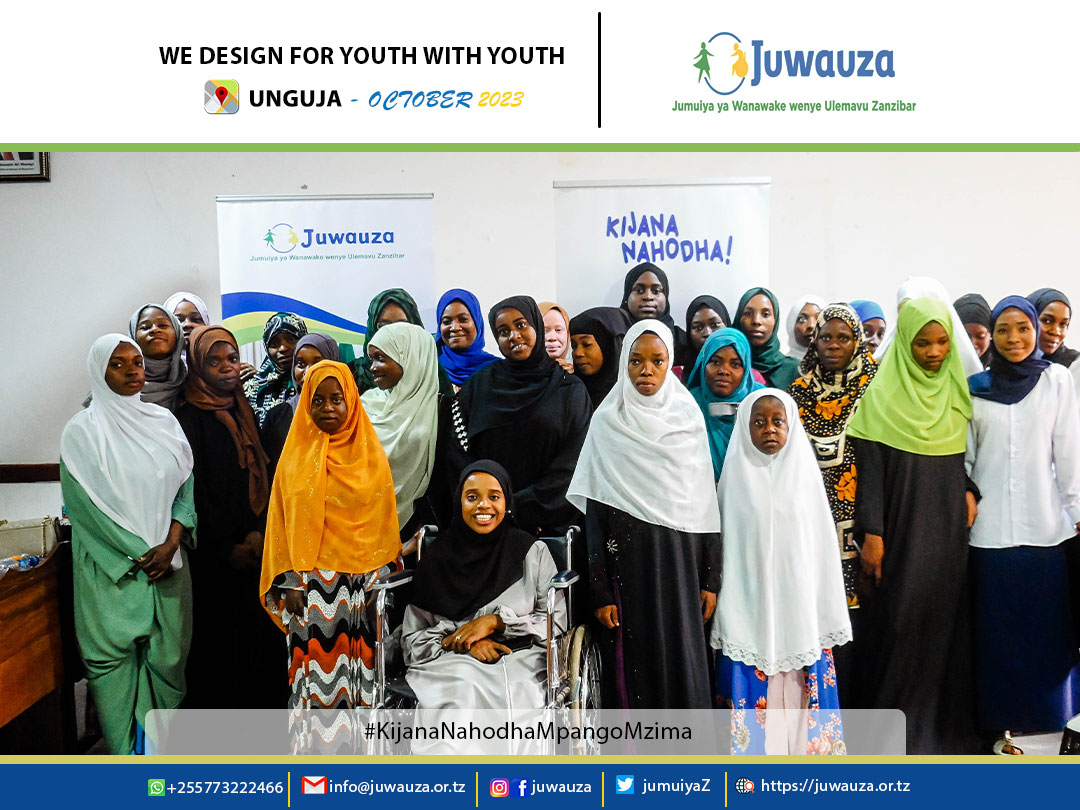| # | Image | Project Name | Description | Reports | Action |
|---|---|---|---|---|---|
| 1 |

|
Capacity Building For Women With Disabilities In General Election 2010 | The organization has experienced working with gender in election during the Zanzibar General Election of 2010 under the UNDP through Deloitte. The project was implemented for four months from July - October 2010 and it had a total budget of 63,021,000 Tanzania Shillings. The project managed to carry out 83 community sensitization meetings on election process and voter education in ten districts of Unguja and Pemba and sensitized 1595 people with different forms of disabilities of whom 865 were females and 730 male. The
project managed to reach out to more than 300000 indirect beneficiaries through
TV and radio programs. Also the project managed to work with community
authorities from district government officials, religious bodies, disabled
people organizations and Zanzibar Electoral Commission (ZEC) and all agreed to
support its implementation by informing people with disabilities about the
project and encouraging them to attend community sensitization meetings. |
||
| 2 |

|
Digital Youth For People With Disabilities | The Digital Advocacy among Youth with Disabilities project aimed to raise awareness about disabilities in society and educate youth with disabilities (PWDs) on the positive use of digital platforms. This initiative encouraged youth with disabilities to leverage social media and other digital platforms to promote their talents, businesses, and skills, while also advocating for the rights of people with disabilities. Led by a team of young women with disabilities. The project provides a platform for youth with disabilities in Zanzibar to voice their challenges and share their experiences. Virtual training sessions, held allowing the participants to discuss issues, design collective solutions, and build a supportive community.
The sessions aimed to increase disability awareness and knowledge of the fundamental rights of PWDs, while empowering youth to advocate for societal change. Topics covered include understanding different types of disabilities, the potential of youth with disabilities, and how they can contribute positively to their communities. The importance of advocacy campaigns for disability inclusion was also emphasized, with participants discussing ways to raise awareness through digital platforms like social media. The youth with disabilities involved in the project have begun creating advocacy messages to promote inclusion and educate society about the challenges and rights of PWDs, furthering the goal of digital advocacy and empowerment. |
||
| 3 |

|
Sisi Ni Wamoja | Jumuiya ya Wanawake
wenye Ulemavu Zanzibar (JUWAUZA) implemented a ten months project named We Are
One. The project was implemented in twenty five constituencies (13 in Unguja
and 12 in Pemba) and a total of 38 shehias (22 in Unguja and 16 in Pemba). The constituencies and
shehias were selected to represent diversity in political leanings
(predominantly pro-opposition communities and predominantly pro-CCM
communities) and a balance of rural communities who historically and
geographically lack adequate or received late information, and more urban
constituencies with better access to information. The project had two strategic
goals to achieve. The first was to
engage a broad based grassroots audience in order to sensitize the Government
of National Unity (GNU) and foster reconciliation amongst communities. The
second was to provide a platform for the documentation of a citizen/grassroots
agenda of issues and recommendations for presentation to policy makers and
other duty bearers towards the implementation of the GNU particularly on
political and electoral reforms. The project aimed at
anchoring national unity and social cohesion throughout the Zanzibari society
(urban and rural areas) by enhancing social cohesion and inclusive political
participation. The project had a total fund of $ 155,000 which was implemented
from August 2021 – May 2022)
|
https://drive.google.com/drive/folders/1EEQxL6CsePhw0ANwhUzF4ONZjux21n3R?usp=sharing | |
| 4 |

|
Strengthening Women In Leadership(SWIL) | The Strengthening Women in Leadership (SWIL) project is implemented by TAMWA Zanzibar in collaboration with JUWAUZA, PEGAO, and ZAFELA. This initiative aims to increase women's participation in democratic processes in Tanzania, particularly in the lead-up to the 2025 general elections. SWIL works alongside national and local institutions, Civil Society Organizations (CSOs), religious leaders, and the media to promote awareness and accountability. The project strives to create an enabling environment for women leaders by challenging patriarchal systems and advocating for legal reforms that support women’s political participation. Key objectives include empowering women with knowledge on leadership and democratic rights, training journalists and media outlets to produce solution-based stories on women’s political rights, and engaging key stakeholders to address legal gaps in women’s leadership. |
||
| 5 |
|
Strengthening Women With Disabilities In Expressing Their Views | The organization implemented the project of Strengthening of Women with Disabilities in expressing their view on the Second Draft Constitution of the United Republic of Tanzania. It was a one year project which cost 28,985,000 Tanzania shillings. The project trained 320 women with disabilities on the UN Convection of Right of people with disabilities, People with Disabilities Act No 9 of 2006 (Right and Privileges) and Second draft of New Constitution of 2013 to 2014.The organization implemented the project of Strengthening of Women with Disabilities in expressing their view on the Second Draft Constitution of the United Republic of Tanzania. It was a one year project which cost 28,985,000 Tanzania shillings. The project trained 320 women with disabilities on the UN Convection of Right of people with disabilities, People with Disabilities Act No 9 of 2006 (Right and Privileges) and Second draft of New Constitution of 2013 to 2014. |
||
| 6 |

|
Supporting Women And Girls With Disabilities | JUWAUZA received a total of 8,000,000 Tanzania Shillings from the Committee of African Countries from Oman in 2015. The amount is directly used to support girls, youth and women with disabilities by providing schools equipment and materials, supporting small business of girls and women with disabilities as well as purchasing 4 wheel chairs, 10 white canes and 10 magnifying glasses. |
||
| 7 |

|
The 2020 Citizen Election Observation In Zanzibar | The Zanzibar Electoral Commission (ZEC) accredited JUWAUZA to observe the 2020 Zanzibar General elections as a local independent citizen-based, non-partisan and impartial observation group. JUWAUZA specific mission was to assess whether the Gender and Social Inclusion Policy of 2015 was observed and determine the extent to which the elections were peaceful and inclusive. Referring to Section 4.3 of the Gender and Social Inclusion Policy of 2015 which set forth on “Prevention and Mitigation of Electoral Violence”, JUWAUZA saw the urge to play an increasingly visible role in the electoral process to consolidate the ongoing democratic gains, to see if there was electoral violence and understanding its merging due to inhibiting factor for free and effective participation of social groups in the electoral process. JUWAUZA’s first election observation effort was made
possible with the support of the United States Agency for International
Development (USAID) through the National Democratic Institute (NDI) which
provided financial and technical assistance where a total of $ 179,092 was
invested to support this citizen election observation. |
https://drive.google.com/drive/folders/1W5mcvnBQpe3hctNSOSzoJT2nTAhPpudG?usp=sharing | |
| 8 |

|
Tushiriki Pamoja (FCS) | Building and maintaining peace requires the voice and leadership of women. In Zanzibar, however, women are still left behind in the peace and reconciliation processes at the national and local levels. The active participation of women has been considered to be less important than that of men. Politics in general is often seen as a violent and dangerous domain that is not suitable for women; it is seen as irrelevant, even if they are affected directly and indirectly by the violent conflicts caused by the various current political divisions. Based on these factors, JUWAUZA implemented a four months project named Tushiriki Pamoja to ensure increased participation of women, challenging attitudes and practices that hinder active and passive participation. This project was funded by The Foundation for Civil Society (FCS) with 27,000,000 Tanzanian Shillings. The aim was to bring a wider adoption, deeper and more inclusive understanding of gender in peace and security, strengthening consideration and recognition of women’s efforts in reconciliation and peace processes in Zanzibar. |
||
| 9 |

|
Tushiriki Pamoja(Era Fund) | Despite constitutional and international measures, women, youth, and PWD are underrepresented in Tanzanian politics. From 1985 to 2020, 95% of Tanzanian women in parliament were selected under special seats (temporary special measures-TSM). Women are underrepresented in politics in part due to the majoritarian electoral system, political parties acting as gatekeepers, corruption, and electoral violence, lack of economic clout, culture, and insufficient civic education. Intra-party and inter-party nominations favor male candidates. Women, youth, and people with disabilities are frequently viewed as unqualified. “Hawauziki” in Swahili means “They have no electoral market value”. Since Tanzania doesn’t allow independent candidacies, political parties control nomination and candidacy. Women’s candidacy may be hindered by male-dominated nomination processes within political parties, especially in the face of intense Intra-party competition. During Intra-party and election campaigns, some female candidates face gender discrimination. The representation of women in TSM is also low. Special seats relegate women to the status of second-class representatives who lack access to electoral resources and constituency funds. Young women with disabilities in Zanzibar have the potential to become future government leaders; they must be empowered and equipped with leadership skills. State and non-state actors must increase their efforts to mentor disabled young women in life skills, good governance, and values-based leadership. Stigmatization, inadequate infrastructure, and poverty prevent the majority of people with disabilities from attending proper education. PWDs' socioeconomic marginalization has serious consequences. Disability- related incompetence limits political resources. According to anecdotal evidence from the 2015 elections, nominees with disabilities were routinely stigmatized by their peers. The Zanzibar National Disabilities Council condemns discrimination and mistreatment of people with disabilities. CSOs, researchers, and policymakers are unable to evaluate policy initiatives for lack of data on voters and candidates disaggregated by disability status. Thus, JUWAUZA with funding support of USD 59,996 from USAID via NDI's ERA Fund, proposed to implement a 12-month open, inclusive, impartial and equitable project aimed at increasing political parties' commitments to gender equality, disability mainstreaming, and legal reform activism. To achieve sustainable results, four political parties (CCM, CUF, CHADEMA and ACT-Wazalendo) will participate in the project’s implementation. The project will involve and utilize the local knowledge of CSOs, OPDs, women’s organizations, and advocates for disability and gender equality to promote gender equality and disability inclusion among political parties and the general public. The project will complement existing electoral support and women’s political participation initiatives. The project will collaborate with political parties, the Zanzibar Election Commission, the House of Representatives, media organizations, community service organizations, and community women. The project advocates for women’s issues and rights in order to promote women in political leadership. To promote women’s issues on the political party’s agenda, both conventional and novel methods will be employed. The project will necessitate the testing and documentation of advocacy tools for future use in similar endeavors. |
||
| 10 |

|
Uraia Wetu | Foundation for Civil Society (FCS) proposes a 36-month action to be implemented in both mainland Tanzania and Zanzibar in collaboration with other 12 CSOs including Jumuiya ya Wanawake wenye Ulemavu Zanzibar (JUWAUZA) to be recruited as sub-grantees. The action is expected to be with a spill over to other 1,000 CSOs to be engaged by the grantees in their specific zones and in the national level events such as CSO Week and Zanzibar Civil Society Convening, to mention a few. The action has an overall objective to contribute to an improved and enabling policy framework and environment for effective civil society engagement as key actors of democratic governance in Tanzania. This overall objective is in alignment with objectives and priorities as stated in the EU Call for Proposals to Strengthen CSOs as Independent Actors of Good Governance and Development in Tanzania, specifically Lot 1: Enabling Environment for Civil Society, with the key objective of fostering an enabling environment for civil society, which supports civic space and CSO-Government dialogue. Similarly, the action is linked with the EU's commitment to the promotion and protection of human rights in its work with partner countries. This is well articulated in the EU and its Member States' joint approach in Tanzania. It aims to combine dialogue, advocacy, and technical interventions specifically related to media freedom, access to quality information and quality reporting; peace and conflict prevention; civic participation, in particular for women and youth; human rights monitoring and advocacy; access to justice, especially for vulnerable populations; and the fight against corruption. The action is also linked to the EU Third Country CSOs Roadmap 2021-2024 which focuses on fostering an enabling environment for civil society, promoting meaningful participation of civil society in multi stakeholder policy processes and strengthening civil society organizations' capacity to promote public accountability, be legitimate representatives of the interests of the citizens groups and effectively perform their roles as independent development actors. The action is also aligned to national policies and laws and particularly the Tanzania Constitution where article 21 (2), states that ‘every citizen has the right and freedom to participate fully in the process leading to the decision on matters affecting him, his well-being or the nation. Therefore, JUWAUZA with funding of TZS 110,000,000 is implementing this project with the intent to generate first-hand information which will guide both the strengthening of civil society and the framing of an agenda for CSO-Government dialogues. Civil Society will be coordinated in a way that they are able to clearly and consistently dialogue with relevant Government structures to influence both policy and practice reforms at both local and national levels. |
https://shorturl.at/qFVrq | |
| 11 |

|
USAID Kijana Nahodha (UKN) | The USAID Kijana Nahodha (UKN) Social Impact Accelerator is part of the larger USAID Kijana Nahodha Project, a four-year initiative running from 2022 to 2026.UKN is Implemented by USAID- Tanzania in collaboration with T- MARC, Tanzania Youth Coalition(TYC), Y- LABS and Care- Tanzania .The project focused on empowering and improving the well-being of 45,000 Tanzanian youth aged 15-25, including young women and persons with disabilities, who face challenges such as unemployment and limited access to opportunities in urban, peri-urban, and rural areas. In 2023, JUWAUZA implemented this initiative in Zanzibar, focusing on addressing the economic challenges faced by young women with disabilities. By providing them with access to financial resources and opportunities for skill and knowledge development, the project empowered these women economically and improved their livelihoods. JUWAUZA played a crucial role in identifying specific needs, leveraging available resources, and creating tailored solutions to promote financial independence for young women with disabilities in Zanzibar.
JUWAUZA contributed to fostering financial autonomy and creating inclusive opportunities for young women with disabilities, enabling them to achieve economic well-being and a sustainable livelihood. |
||
| 12 |
|
ZanID Campaign | Under the established Ushiriki Tanzania (UT), the Zanzibar UT members who are JUWAUZA, CYD, PIRO and ZLSC collaboratively was funded to implement the ZanID project in both Unguja and Pemba. The process was made possible under the support of United States Agency for International Development (USAID) through the National Democratic Institute (NDI). The project was aimed at increasing awareness among youths, women and people with disability (PWD) on the accessibility of the Zanzibar identity cards (ZanIDs) as a pathway to access their socio-economic needs. The major objective of this project was to create a Community forums with PWDs from 6 districts of; Urban, Central, North 'A', West 'B', Mkoani and Micheweni so as to increase awareness among people with disability (PWD) especially women and girls on the accessibility of the Zanzibar Identity Cards (ZanIDs) as a pathway to access their socio-economic needs. The project had a total fund of $ 85,641 which was implemented in a five months (May – September, 2020) |